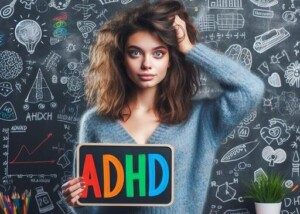Many adults want to know if ADHD is actually a child’s disorder or if, indeed, adults can have it.
If we look at what “ADHD” stands for – attention deficit hyperactivity disorder – certainly we can easily come up with at least a few names of adults we know who are definitely hyperactive or impulsive in the way they go about life – or at least for specific situations.
And maybe these same people tend to have wandering attention spans or get easily distracted or disorganized, even if it’s only in specific environments.
To say that ADHD doesn’t exist in adults is to say that there’s no such thing as an adult who’s easily distracted, forgetful or “spacey,” nor who tends to be jumpy, fidgety, struggles with working memory or is seemingly unable to physically relax.
There are definitely adults who fit these descriptors.
But something needs to be made clear.
Just what is “ADHD” in terms of a single entity?
“Adult ADHD is a descriptor of behaviors that are emitted by an individual,” says Dr. John Huber, a clinical forensic psychologist and chairman for Mainstream Mental Health, a nonprofit organization that brings positive change to the lives of those with mental illness.
“It’s not a reason for those behaviors. It is typically a tallying list of behaviors, and they can be caused by a lot of things that include sleep deprivation. Depression is another one.”
In other words, the symptom set of ADHD overlaps with numerous other conditions.
However, ADHD (and inattentive ADHD) is recognized as a lifelong neurodevelopmental disorder by the DSM-5, the diagnostic tool for U.S. mental health specialists.
Untreated sleep apnea, too, can lead to ADHD symptoms. Merely having the symptoms doesn’t automatically mean that an adult has the actual neurodevelopmental condition (which they would have had since early childhood).
Attention deficit hyperactivity disorder is a four-word term that refers to a particular group of behaviors or symptoms.
Dr. Huber continues, “Does this individual as an adult all of a sudden manifest some neurological deficits that show up as ADHD — I would argue probably not, as ADHD needs to be present before the age of six” for a proper diagnosis.
“Can adults exhibit the behaviors similar to ADHD? Yes. However, the causes are different.”
Nevertheless, there are adults with a new diagnosis of ADHD or inattentive ADHD who, for all their lives, beginning in early childhood, have struggled with various issues that are the hallmarks of this condition.
These include struggling with focus, frequently losing things, often making careless mistakes, and difficulty with following instructions or completing tasks.
There may have also been excessive “fidgeting” throughout childhood, that the adult has taught themselves to suppress when around other people.
Autism Misdiagnosed As ADHD
This is possible. It’s also relatively common for autism to be misdiagnosed as only ADHD.
If it seems that there’s more going on in the adult with an ADHD diagnosis, an autism assessment should be considered. Autism often comes with ADHD (“AuDHD”).
 A mental health professional for 20+ years, Dr. Huber has appeared on over 300 top-tier radio shows (NBC Radio, CBS, Fox News Radio) and 30 national TV programs (ABC, NBC, Spectrum News).
A mental health professional for 20+ years, Dr. Huber has appeared on over 300 top-tier radio shows (NBC Radio, CBS, Fox News Radio) and 30 national TV programs (ABC, NBC, Spectrum News).
 Lorra Garrick has been covering medical, fitness and cybersecurity topics for many years, having written thousands of articles for print magazines and websites, including as a ghostwriter. She’s also a former ACE-certified personal trainer.
Lorra Garrick has been covering medical, fitness and cybersecurity topics for many years, having written thousands of articles for print magazines and websites, including as a ghostwriter. She’s also a former ACE-certified personal trainer.
.










































